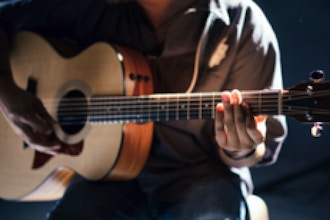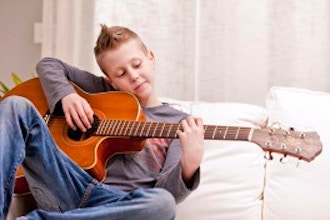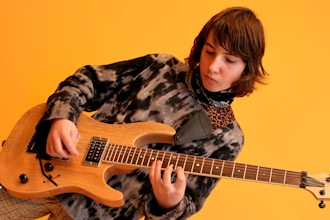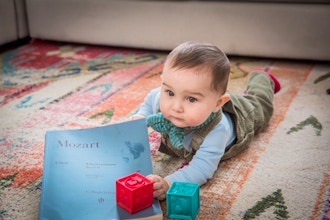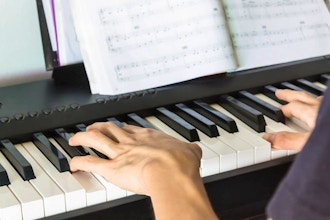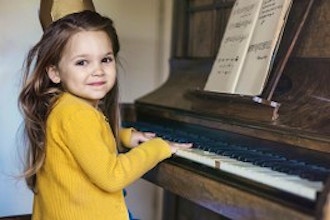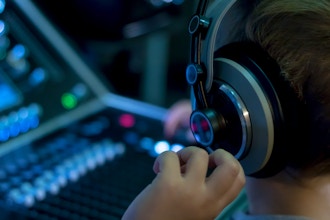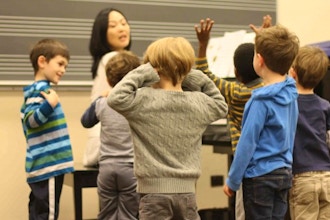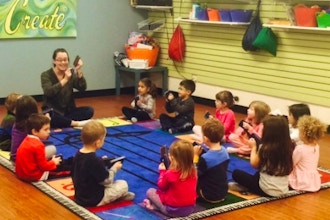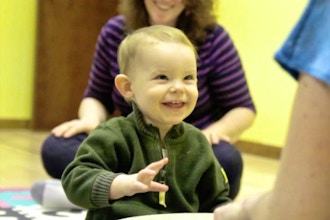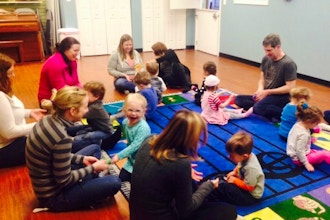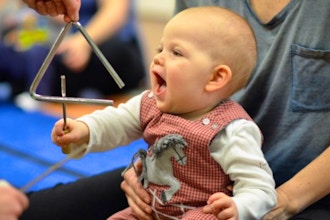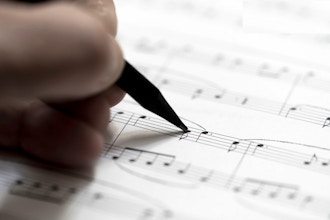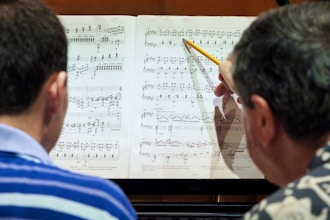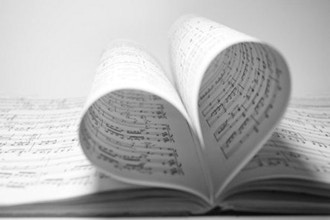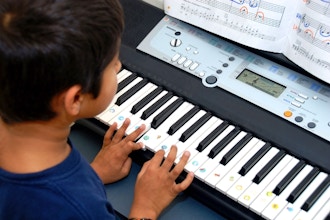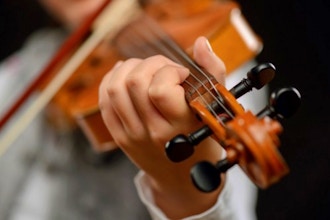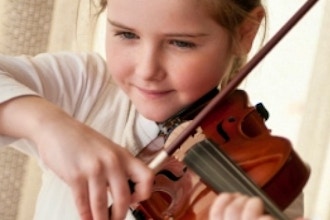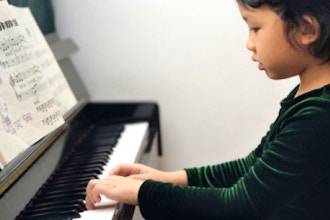Discover the Best Kids' Music Classes Near Me
You’re likely familiar with at least one of the following names and have probably even heard multiple songs of theirs: Katy Perry, Alanis Morrisette, Justin Bieber, Stevie Wonder, Taylor Swift, and Aretha Franklin. What you may not be familiar with is that all of these musical artists started their careers when they were still in their teenage years. It’s never too early for a child to start learning music, whether by playing an instrument, learning about music production, or singing. Taking kids’ music classes is a great way for your child to get started in the world of music. It’s possible too that with enough time and practice, their name may even be written alongside those listed above.
Why You Should Learn Kids' Music
Once upon a time, you may have heard something along the lines of “Kids who listen to Mozart are smarter than those who don’t.” And while the evidence for that claim is a bit nebulous, the good news is that even at slightly older ages, kids who play music show signs of stimulated brain function. Things like spatial awareness and language development are benefitted from a child’s involvement in playing music, and some studies even suggest that IQ can shoot up a few points for children who can play an instrument.
In a similar vein, both playing and listening to music have been linked to lower stress. Music helps the brain create the “feel-good hormone,” dopamine, and thus can help us feel more productive and rewarded both when playing music and when shifting our time and attention to other tasks. No matter how you look at it, music is good for both the body and the mind. And although it’s never too late to learn to play an instrument or sing, the younger you start, the better off you’ll probably be in the long run.
5 Ways to Learn Kids' Music
With a little direction, it’s not too difficult for kids to get started with music. While having an experienced instructor can make the process of learning much easier, there are a few other options for starting, including:
- Sign up for an in-person class with an expert instructor. In-person classes also offer a bit of flexibility, including whether you want your kids to have private lessons or group lessons with other children. Both options have benefits: on the one hand, your child will get direct, focused, 1-on-1 attention. On the other hand, your child will likely make new friends to practice with. Depending on the kind of class, instructors may also be able to provide instruments and sheet music in some cases.
- Enroll in a live online class with an instructor who will provide real-time feedback. Like their in-person counterparts, live online classes can often be taken privately or with a small group of fellow participants.
- Use a video-sharing site like YouTube to find on-demand tutorials. The ability to go at your own pace is appealing to many people, as are the perks of such videos being widely available and free. However, getting any feedback or answers to questions through comment features is incredibly difficult; the absence of a live instructor is especially noticeable in situations where your child could benefit from immediate feedback.
- Purchase or borrow a music theory book or a beginner text for an instrument of your choice. With a little music theory knowledge, it’s easy to understand the basics and produce a few notes on your own, but not having an audio reference for how notes should sound will perhaps make this a more difficult method for true beginners.
- Download a beginner music app. There’s a wide variety of apps out there for kids to start learning music, and while most will offer audio (and sometimes video) tutorials, students may still bump into difficulty when they need immediate feedback on their playing. Still, apps can help provide some incentive to practice consistently, especially those apps with a more gamified approach.
In-Person Kids' Music Classes
Music is something that’s enjoyed in even some of the remotest corners of the world. This means that many, many communities across the United States will have in-person kids’ music classes. This is good news for those who learn best with the constant guidance of expert instructors. Not only does an in-person class offer a great start for kids jumping into music, but it also allows students to improve both quickly and steadily thanks to the immediate feedback of teachers and the ability to observe live demonstrations.
Astoria Values Inc.’s Guitar/Violin Class at Ditmars Steinway in Queens, NYC, is perfect for kids interested in getting started with guitar, violin, or both. The class offers a combination of hands-on instrument playing with the teaching of basic music theory. This means kids will learn about notes, chords, scales, and other musical building blocks as they work towards playing entire songs.
If the piano is what your child is wanting to get into, these Private Piano Lessons from Further Music School offer tons of flexibility. For example, classes are available in 30-minute, 45-minute, or one-hour blocks. Additionally, classes are offered both in the Financial District of Manhattan and in the Forest Hills neighborhood of Queens, NYC. Instructors have received degrees from some of the most prestigious schools in New York and the surrounding area, including Juilliard. Beginning students will learn music fundamentals, including the basics of sight-reading, piano technique, and music theory, with more advanced concepts and techniques being covered as kids move toward an intermediate level.
Maybe your child wants to one day headline a performance at the Hollywood Bowl. A great start to that dream would be taking this Singing for Children Class from Los Angeles City College in East Hollywood. Any child between five and ten years old is welcome to enroll. Kids will focus on proper vocal and breathing techniques, as well as developing confidence for singing in just about any musical setting. To these ends, your child will likely learn scales, simple melodies, how to sing vowels, and receive basic ear training.
If you have an older child or young teenager who’s obsessed with beats and electronic music, then the five-day Kids DJ Summer Camp from Scratch DJ Academy in the Sawtelle district of LA’s Westside offers everything needed to get started. This camp will have kids working together to beat-match, mix, scratch, and more. In addition to music theory knowledge, kids will also get the opportunity to practice team-building and problem-solving skills together; even math skills will be utilized as kids learn about DJing equipment and balancing audio levels. The camp will culminate in a DJ expo where kids will get to put their new skills on display and perform for parents and families. The only materials students will need beforehand are their own pairs of headphones.
Washington D.C.’s National Conservatory of the Arts in Crestwood offers plenty of kids' music classes, including this Beginner Piano (Ages 6-8) Class for small groups of children. Students will learn the basics of piano study, particularly proper playing techniques and how to read music. Children will be exposed to multiple musical styles and even participate in concerts to demonstrate their learning. Another nice element of these beginning group classes is that teachers will help facilitate the transition to individual lessons for each student if your child wants to continue once they’re ready for private lessons.
Parents in the Chicago area may want to consider this Songwriting Class from North Shore Music Institute in the Northfield suburbs. This 12-week course is separated into three distinct sections so that kids can get an in-depth, holistic approach to songwriting. Students will create three original pieces of music each, including an original song, a song arrangement, and a composition. Part of the class experience includes working with a professional band to rehearse, record, and mix one of the student’s original pieces of music. This class provides the perfect opportunity for your child to explore interests in both writing and music.
This 8 Week Voice Mini Class in Mt. Juliet, TN is for kids who are aspiring vocalists, soloists, or singer-songwriters. The course will focus on crucial fundamentals of singing, such as sight-reading, diction, vowel placement, and chest voice. Students will even get to choose some songs they’d like to work with throughout the course. The Nashville area has over 190 recording studios and roughly 80 record labels, so a class like this camp from Collective Art School of Tennessee might be the perfect start for a child who hopes to break into the music industry.
Your child can be immersed in both music and Spanish language and culture in the Canta y Baila Conmigo Class from Prelude Music Classes for Children. Head to Greenway Plaza in Houston, TX for a class where your child can join an interactive environment that combines music education with the Spanish language and the music of Spanish-speaking cultures. The class is open to any child aged five or older with the accompaniment of an adult.
For parents in the Denver area, you could take your child to nearby Parker, CO for Taminga Music’s Theater: Pop Star Mini Class. This class emphasizes singing, dancing, and general performance knowledge. Kids will certainly spend plenty of time doing standard music and choreography work. Still, this class will also provide experience through interactive games and confidence-building activities to keep the experience fresh and varied throughout. Family and friends can see the fruit of their little ones’ work during an end-of-season performance.
Virtual Kids' Music Classes
In-person kids’ music classes are a great way for children to not only improve their music skills but also to make friends and foster a collaborative atmosphere. However, in-person music classes aren’t always available, especially in more rural areas.
Thanks to the internet, however, there are plenty of online kids’ music classes available to you so long as you have a stable internet connection and a device with a camera and microphone (i.e. a computer, tablet, or even most smartphones). A virtual class may even prove the best option for people even with in-person classes relatively close by; just imagine all the time you’ll save on commuting.
One potential downside of virtual kids’ music classes is potentially navigating an audio delay on video conferencing software. This can make classes where kids are in small ensembles and need to play in sync particularly tricky. Because of this, many online music classes may emphasize each student getting set amounts of individual practice time in a group setting, or they may find other approaches that are best for that particular course’s focus. Generally, the workarounds prove more than sufficient, and students are still able to have a great experience in their classes.
The Vocal Lab and Music School’s Youth Vocal Performance Class is for kids ages 11-14 who are aspiring vocalists. Each class will begin with a warm-up exercise or two and often a conversation about various aspects of performance. Then, each student will get ten minutes to practice in front of the class. This means that students will get dedicated 1-on-1 time with an expert instructor, but they’ll also have the benefit of picking up additional tips and techniques by watching their peers work as well. A recital will be held after the course for friends and families to observe and celebrate their child’s progress.
You’ll need your own piano or keyboard for Los Angeles City College’s Piano/Keyboarding for Young People (Beginning) Class, but any children between the ages of 8 and 17 are welcome to sign up. In this course, students will learn basic musical notes and how to read them, learn basic music theory, and improve both their finger coordination and listening skills. Instructors will also encourage and help students learn discipline in good practice habits so that your child is sure to steadily improve.
If the guitar is the instrument your child won’t stop talking about, you could try enrolling them in New York Guitar Academy’s Kids Absolute Beginner Guitar Class. This class is for children ages 8-11 and is equipped to teach both right and left-handed guitar playing techniques. Another benefit is that students will practice playing both lead and rhythm guitar, so in addition to learning how to read music notation, students will learn single-note melodies, chords, and various strumming patterns through engagement with multiple genres of music. At the end of this eight-week course, well-practiced students will be able to comfortably play full songs. Completion of the course also ensures students are ready to transition smoothly to a higher-level course if further instruction is desired.
Private Group Kids' Music Classes
CourseHorse has live online group classes that can be delivered directly to members of your team or organization. If you’ve been looking for a fun team-building event, then bringing your children together for some private group kids’ music classes could be a great option.
Whether your team members want to be directly involved in the class with their children or simply kick back and observe the kids with the other parents and guardians, CourseHorse will gladly accommodate your team’s unique needs and circumstances. Simply reach out through their online contact form to learn about available options and start setting up the perfect kids’ music class for your team.
The process of booking with CourseHorse is very easy: no booking fees, confirmation emails within 24 hours of booking, and the ability to change group sizes after registration if needed. Also, despite Zoom being the default platform for group classes, CourseHorse will accommodate other platforms like Microsoft Teams or Google Meets if that’s what your team is more accustomed to using.
What Will I Need to Learn Kids' Music?
Regardless of what instrument your child decides to pursue, you’ll need to acquire a few supplies. However, these largely depend on the instrument itself. For example, a practicing violinist will need different materials than a guitarist or pianist. However, supply lists for any instrument are usually pretty small, and most materials need to be replaced only rarely, which is a bonus. That said, here’s a general list of what you might need based on the instruments your child wants to play.
- An instrument itself. Whether a guitar, piano, ukulele, violin, brass, or wind instrument, your child will need their own instrument to practice both during and outside of lessons. If your child is interested in vocal lessons, the good news is that they already have the necessary instrument and there’s no purchase necessary. For most other instruments, it may be worth considering finding something suited to your child’s size. For example, young children might have difficulty playing upright bass, but guitars and pianos almost always come in sizes more suited to kids regardless of age.
- A music stand. Regardless of whether an instrument should be played sitting down or standing up, you’ll need a reliable way to hold sheet music while you’re practicing. Note that most pianos and keyboards have built-in sheet music stands, so you won’t need to worry about purchasing a standalone holder if your child is working with either of these instruments.
- A comfortable chair. Again, most instruments allow for some combination of standing and sitting, but in any case, having a comfortable place to sit and practice (or rest) will make a big difference for your child. You may need to double-check what type of chair is best suited to each instrument, however. For example, benches without a backrest are preferable for pianists to allow for a fuller range of motion while playing.
- A storage or carrying case. While pianos and keyboards sort of store themselves wherever they are in a room, almost any other instrument will benefit from having its own carrying case. Such cases afford an instrument a degree of protection when being transported from place to place and prevent them from getting coated with dust too quickly when not being used.
- For most other materials, it just depends on the type of instrument your child plays. In most cases, you’ll want tools for proper tuning and instrument care, like cleaning cloths or sprays. But other supplies might only be necessary for certain instruments. While supplies for every instrument can’t be covered, here’s a small list of a few specialty items you may need to watch out for.
- Replacement strings for string instruments like guitars and violins.
- A clamp for guitars.
- A small, personal amplifier for electrical instruments like electric guitars.
- A metronome is optional for any instrument but is a great tool for helping kids learn how to play instruments to a particular beat and speed.
- Rosin for bowed string instruments like violins and cellos.
- Antibacterial spray and valve oil for woodwind and brass instruments.
- Soothing teas, humidifiers, or similar items to help alleviate vocal stress for singers.
Is it Difficult to Learn Kids' Music?
Like many hobbies, becoming a proficient musician requires lots of dedication and consistent practice. This is even more crucial if kids hope to become advanced musicians. This is why many parents want to see their kids start young; the earlier a child starts and the more time they dedicate to their craft, the quicker they’ll be in reaching those high levels of performance. Despite the likelihood of many days where a song is taking a long time to master or feeling frustrated at numerous mistakes, these issues can be overcome, especially with the help of an encouraging instructor with expertise in your child’s chosen instrument. Music, despite such difficulties, remains an incredibly accessible and rewarding activity for any child to participate in.

.png?auto=format%2Cenhance%2Ccompress&crop=entropy&fit=crop&h=220&ixlib=php-1.2.1&q=90&w=330)
